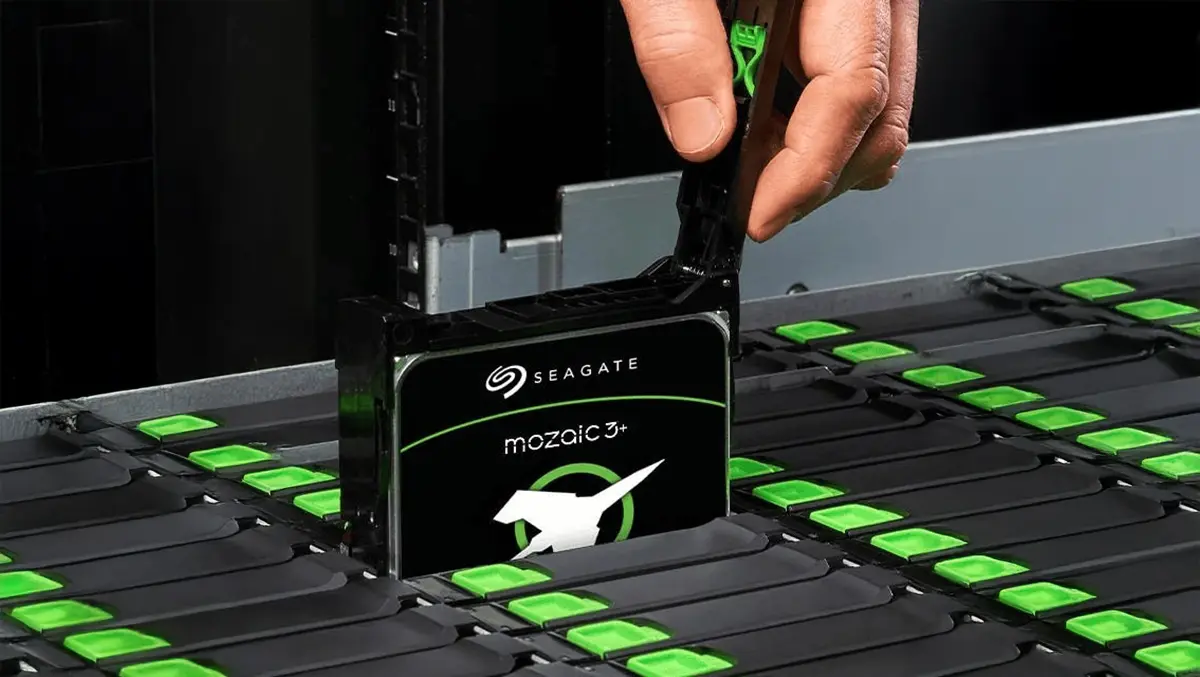
Seagate ships Exos M drives up to 36TB with Mozaic 3+
Seagate Technology has announced the shipment of Exos M hard drive samples in capacities up to 36 terabytes, using its Mozaic 3+ platform based on heat-assisted magnetic recording (HAMR) technology.
This announcement marks a significant development in data storage solutions, particularly for large-scale data centre applications. Seagate is currently accelerating the production of Exos M drives with capacities reaching up to 32TB for a leading cloud service provider, while also beginning to sample the higher 36TB capacity drives to certain customers.
The Mozaic 3+ technology plays a critical role in enhancing storage capacities by supporting a 300% increase in storage within the same data centre footprint, reducing cost per terabyte by 25%, and lowering power consumption per terabyte by 60%. The Exos M design incorporates 10 platters, with Seagate achieving an areal density of 3.6TB per platter, the only data storage firm to achieve this density currently, and is working towards achieving 10TB per platter.
Among the first adopters of the Mozaic 3+ platform is Dell Technologies, which is set to integrate the Exos M 32TB drives into its high-density storage systems. "As customers build out their AI factories, they need cost-efficient, scalable and flexible storage engineered to reliably handle the most demanding AI workloads," said Travis Vigil, Senior Vice President of ISG Product Management at Dell. "Dell PowerScale with Seagate's HAMR-enabled Mozaic 3+ technology plays a crucial role in supporting AI use cases like retrieval augmented generation (RAG), inferencing, and agentic workflows. Together, Dell Technologies and Seagate are setting the standard for industry-leading AI storage innovation."
Seagate CEO Dave Mosley commented on the broader implications of data storage advancements, stating, "We're in the midst of a seismic shift in the way data is stored and managed. Unprecedented levels of data creation – due to continued cloud expansion and early AI adoption – demand long-term data retention and access to ensure trustworthy data-driven outcomes. From capturing training checkpoints to archiving source-data sets, the more data organisations retain, the more they can validate that their applications are acting as they expect them to – and adjust course as needed."
Mosley added, "Seagate continues to lead in areal density, sampling drives on the Exos M platform of up to 36TB today. Also, we're executing on our innovation roadmap, having now successfully demonstrated capacities of over 6TB per disk within our test lab environments." Furthermore, he noted, "As the world's leading producer of exabytes, and the only manufacturer capable of manufacturing 3.6TB per platter hard drives at scale, Seagate is laser-focused on delivering the storage scale required for the applications of the future."
Industry insights from research firm IDC were provided by Kuba Stolarski, Research Vice President for service provider infrastructure, who said, "As businesses and people everywhere continue to use AI applications, more widespread adoption of AI is creating unprecedented amounts of data. All this data needs to be replicated and retained for the long term. Our research shows that hard drives continue to be a critical technology for delivering this scale, with 89% of data stored in the data centres of leading cloud service providers stored via hard drive. We believe Seagate's progress in areal density innovation positions them well to address increased demand for data storage."


